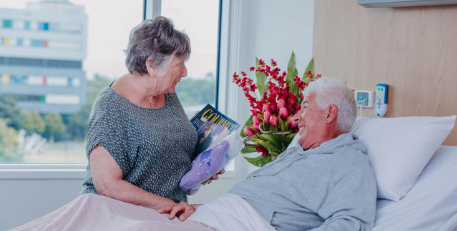
You're in the best hands
Whatever your reason for surgery, you’re in highly skilled hands at Melbourne Private Hospital.
Our team of highly accomplished neurosurgeons perform life-changing procedures here in the inner north of Melbourne. Our Neurosciences Unit is located in Parkville, which is convenient for our local patients and their families as well as the many interstate and overseas patients we welcome each year.
Our team has close ties to the prestigious Royal Melbourne Hospital, which has one of the leading neurosurgical programs in Australia.
Find a neurosurgeon
Our neurosurgeons are dedicated to treating patients with disorders affecting the nervous system.
Find a spine surgeon
Our spine surgeons and orthopaedic spine surgeons are experts at treating a range of spine conditions.
Find a neurologist
Our team of neurologists work with patients living with conditions affecting the nervous system.
Conditions and disorders
We provide expert care for a range of neurological and spinal conditions.
Brain tumour surgery is one of the most common neurosurgical procedures. As tumours grow, they can affect brain function and lead to a range of symptoms and complications. Surgery is designed to alleviate symptoms and, in some cases may improve the effectiveness of treatment. A biopsy maybe required to test a tumour, along with surgery to remove and/or reduce the tumour.
Blood vessels that supply oxygen to the brain can become blocked, malformed, or tear, making a stroke highly likely. Conditions like bulging blood vessels (aneurysms), blocked arteries, and arteriovenous malformations (AVMs) may require urgent neurosurgery.
The peripheral nervous system connects the brain and spine (central nervous system) to the body. Peripheral nerves can be affected by pressure, injury or growths (usually benign), leading to symptoms including pain, tingling and movement difficulties. Surgery aims to relieve symptoms and restore function.
These tumours form in the space below the brain, behind the eyes and nose, and can be malignant or benign. They need to be removed to alleviate pressure on the areas of the brain and vital nerves involved in movement, vision and hormonal function. Minimally invasive neurosurgery is often appropriate for skull base procedures.
Our specialists perform procedures to treat spine conditions including compressed or ‘pinched’ spinal nerves, degenerative disc disease, spinal stenosis, trauma, deformities such as scoliosis and tumours. We specialise in minimally invasive techniques.
Brain and spinal surgery
Neurosurgery involves intricate procedures to treat conditions or injuries affecting the spine, brain and peripheral nerves.
Our highly skilled neurosurgeons and spine surgeons use the latest technology to manage a range of conditions affecting the nervous system.
Our world class surgeons perform a range of procedures:
Neurosurgery
- Acoustic neuromas and pituitary tumours
- Awake craniotomy
- Brain surgery and endoscopic brain surgery
- Brain and skull based tumours
- Cerebrovascular disorders
- Interventional neuroradiology
- Peripheral nerve surgery
- Trigeminal neuralgia
Neurology services
Neurologists specialise in diagnosing and treating conditions involving the brain, spinal cord and peripheral nerves.
- Neurological disorders such as Parkinson's disease, multiple sclerosis (MS) and motor neurone disease
- Brain or spinal injuries
- Infections of the nervous systems such as meningitis or brain abscesses
- Headaches and migraines
- Seizures and epilepsy
- Aneurysms (dilated blood vessels in the brain)
- Peripheral neurological conditions, including nerve conduction studies
- Epilepsy and EEG studies
- Movement disorders and functional neurological disorders.
Spine surgery
- Cervical discectomy (fusion and disc replacement arthroplasty)
- Lumbar decompression for canal stenosis (minimally invasive and open)
- Lumbar discectomy (minimally invasive and open), including day surgery
- Lumbar fusion (minimally invasive and open)
- Minimally invasive spine surgery


Why choose Melbourne Private Hospital?
At Melbourne Private Hospital there are minimal wait times for surgery, and you can choose your own specialist.
Our neurosurgeons, spine surgeons and neurologists work with a multidisciplinary team of experts to get the best possible outcome for you. Our nurses deliver exceptional care in our wards with passionate allied health professionals to support your recovery.
Depending on your needs, your rehabilitation may occur as an outpatient, or as an inpatient at one of our dedicated Healthscope rehabilitation centres. Here you’ll be cared for by a dedicated team, experienced in providing rehabilitation after neurosurgery.
Dorset Rehabilitation Centre
Victorian Rehabilitation Centre
The private experience
When you choose private, expect better.
At Melbourne Private Hospital your private patient comfort includes:
- Admission at a time that is convenient
- Comfortable accommodation
- Discharge planning support
- PressReader – digital access to 7,000+ magazines and newspapers

Care after surgery
Providing comprehensive quality care for our patients is our priority. Following surgery, patients are cared for in a dedicated Intensive Nursing Unit (INU) by experienced, qualified neurosurgical nursing and allied health staff.
Risks
All surgical procedures carry some risk and only a specialist can advise whether surgery is right for you. Before agreeing to any treatment, make sure you understand the benefits and risks of the surgery that is being proposed.
How much will it cost?
Many surgeries performed in a private hospital involve an out-of-pocket fee. The amount will depend on the surgery you’re having and - where you have private health fund cover - whether the surgery that is right for you is included in that cover. Your surgeon will be able to give you an indication of out-of-pocket costs.
If you don’t have private health insurance or you’re an overseas patient, you can choose to self-fund your surgery. Your surgeon can talk to you about this option.




